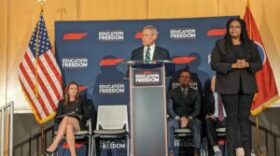Tennessee Gov. Bill Lee and Republican leaders — predicting passage of a private-school voucher bill in 2025 — will have to outflank conservative groups as well as opponents such as the Tennessee Education Association.
Tennessee Stands, a far right advocacy group run by Gary Humble of Franklin, balked at the governor’s voucher plan during this year’s session and plans to continue fighting it in 2025. Likewise, the Tennessee Firearms Association run by John Harris is against the governor’s proposal, which in its second year would provide $7,000 each for every student in the state to enroll in a participating private school, possibly costing $800 million.
“Definitely we’ll be prepared to oppose … and when I’m speaking (at events), I’m in strong opposition to vouchers. I know this isn’t going to go away, so I’m quite confident this will be the talk of the session leading into 2025 and on and on until they get something done,” Humble said this week.
Accused this year of aligning with the Tennessee Education Association, Humble noted he isn’t siding with the teachers’ union but is “fundamentally” opposed to putting tax dollars into private education.

State Rep. Scott Cepicky tried to massage the House version of the voucher bill late in the 2024 session to satisfy homeschool parents and remove them from the bill. If a final bill had surfaced, it likely would have exempted homeschoolers, which Humble said he supports.
He pointed out education and teaching regulations are “bound to follow” into private education and homeschools if state money is shifted to those schools, because “strings are always attached to tax dollars.”
Humble’s stance puts him in direct conflict with Senate Majority Leader Jack Johnson, who said he is “aligned” with the governor on private-school vouchers. Johnson narrowly defeated Humble in the 2022 election, and they are expected to clash again.
Harris, whose group is considered more of a gadfly than a power broker in the General Assembly, nevertheless, caught some people’s attention with a Facebook post saying the government has a role to play in public schools but not in private education.
The post claims the solution for improving public education is not to shift tax dollars to allow parents to enroll their children in private schools, calling such a move an “abdication of the legislator’s duty and stewardship.” Further, he said private-school vouchers would open the door to allow Islamic extremists and Chinese interests to fund private schools.
“Truly conservative legislators would not abdicate the duty to make sure that the public school system is operating with excellent [sic] and efficiency,” Harris’ post said.
He added that lawmakers who are backing the governor’s proposal instead of trying to repair the public school system are “just evidence of legislators who perhaps do not need to be legislators.”
With elections looming this fall, pro-voucher groups are expected to flood the field with funds to boost the chances of Lee’s plan passing in the 114th General Assembly.
Lawmakers were caught between their allegiance to local school boards that are often the largest employers in their districts and the threat of dark money groups that will back election opponents this year.
TEA President Tanya Coats argued that the Legislature should spend $7,000 more per student in public schools to move Tennessee out of the nation’s bottom 10 for investment.
“The only choices this program would provide are the choices for private schools to profit off Tennessee taxpayers and cherry-pick the students they want to educate,” Coats said in an association statement.
Lee acknowledged he will talk to legislative candidates this summer and let them know about the proposal’s importance to provide parents with “school choice.”
The governor said immediately after the Legislature adjourned sine die that it usually takes more than one session to pass bills on “big issues” and noted he feels “certain” the plan will advance in 2025.
Lawmakers approved $144 million for the so-called “education freedom” bill, even though the measure itself didn’t advance. Lee called that funding move “significant” and said, “That shows a clear intent that we lead in this concept and we expect it to happen next year.”
Lt. Gov. Randy McNally, who has been in the Legislature for some 45 years, pointed out when former Gov. Lamar Alexander passed his Better Schools plan in the 1980s, it took two sessions.
“It’s an important bill, and I think we can get there,” McNally said.
Lee’s proposal, which he introduced to great fanfare in late November 2023 with the help of Arkansas Gov. Sarah Huckabee Sanders, morphed into three bills: one from his office and two widely disparate measures from the Senate and House.
The House bill contained items designed to entice approval from teachers and rural lawmakers such as funds to reduce insurance premiums and pay for school construction projects. It would have cost up to $400 million.
Senators and House members hit an impasse, though, on items such as reduced standardized testing and a proposal to allow students to transfer across public school district lines. Lawmakers negotiated until mid-April before Lee declared the matter dead for the year.
“We got very close. We moved forward on major initiatives, but it was an inability to close the gap in the final days,” Lee said.
House Speaker Cameron Sexton, who opposed the governor’s Education Savings Account program in 2019 but backed this measure, said all the groups involved in talks, including TEA, school boards and superintendents, knew the items that would be in the 2024 bill, including the enticements.
“That does not mean it’s next year’s bill, and they understand that. That’s the consequences of it not happening this year,” Sexton said.





